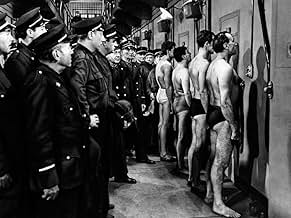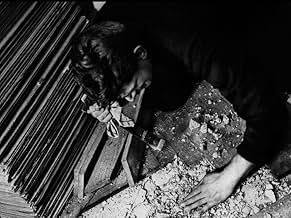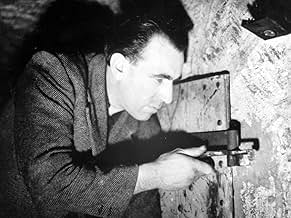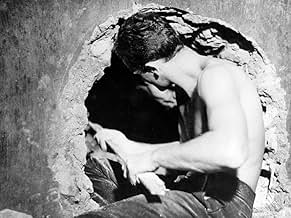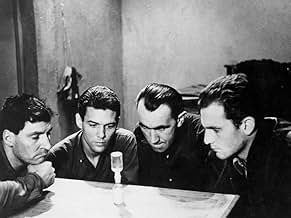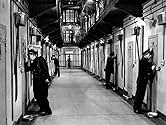Le trou
- 1960
- Tous publics
- 2h 11m
IMDb RATING
8.5/10
22K
YOUR RATING
Distrust and uncertainty arise when four long-term inmates cautiously induct a new prisoner into their elaborate prison-break scheme.Distrust and uncertainty arise when four long-term inmates cautiously induct a new prisoner into their elaborate prison-break scheme.Distrust and uncertainty arise when four long-term inmates cautiously induct a new prisoner into their elaborate prison-break scheme.
- Nominated for 2 BAFTA Awards
- 2 wins & 4 nominations total
Marc Michel
- Claude Gaspard
- (as Mark Michel)
Jean-Paul Coquelin
- Le lieutenant Grinval
- (as J. Paul Coquelin)
Albert Augier
- Un gardien
- (uncredited)
Jean Becker
- Un gardien
- (uncredited)
Mick Besson
- Deuxième plombier
- (uncredited)
Georges Bielec
- Figurant
- (uncredited)
Raymond Bour
- Un gardien
- (uncredited)
Philippe Dumat
- Un gardien
- (uncredited)
Gérard Hernandez
- Le détenu à l'infirmerie
- (uncredited)
Jean Luisi
- Un détenu
- (uncredited)
Featured reviews
10palmiro
This film is riveting in its attention to the details of a prison escape and to the relations between the men involved. And even if you're not interested in the Marxist vision that inspires Becker in this last film of his, you will still be captivated by the story. In any case, to understand Becker's vision, I will necessarily have to give away the story so beware (and my analysis also makes the film sound much more schematic and polemical than it will appear to you on viewing it):
***SPOILER***
At the beginning of the film one of actors (clearly a car mechanic) approaches the camera and tells us that we are about to see a true story, his story. We are led to believe that it is the story of an escape from prison, and indeed we are taken to Paris' largest prison where a group of 4 cellmates, already plotting their escape, finds that they are unexpectedly joined by a new cellmate: a well-dressed (all prisoners wear their street clothes), somewhat effete, young man who nominally sells cars at (presumably) his father-in-law's dealership--in any case, it's clear that he doesn't really have to work or at least work hard for a living. On the other hand, the other four are clearly working-class guys who've drawn a bad card in life. After debating among themselves whether to let the pretty boy in on their plot, they decide to do so after they learn that he's in for attempted murder and stands to have a strong reason to want to break out.
Becker shows the extraordinary ingenuity of the working-class prisoners in contriving tools, in developing a postal system between cells, and in setting up a way of telling time where there are no clocks or church bells. The implication is: we, the working class, have the minds, the manual dexterity, and the willingness to work and to build our own civilization (minus the bourgeoisie). Meanwhile, the bourgeois type is astonished at how the working-class types are able to organize and think for themselves ('I've never met men like you before')- -and, above all, he is moved by their willingness to share their victuals and their plans for freedom with him. And it is just this solidarity and mutual support which Becker believes represents an alternative way to organize human society--an alternative to the self-centered world of the bourgeois. Note, for example, the character of 'Joe' who opts to not join in the escape because the police would harass his mother to death, but who still does not rat on the others even though it's clear he will have to do additional time and time in solitary after the breakout. Becker has a nice touch as well in the way he portrays the prison guards, also from the working-class: generally friendly towards the 'boys' in prison, with perhaps an authoritarian streak in them but no suggestion of a sadistic, brutish nature. So when 'Roland' says, 'Poor Gaspard,' after the latter has betrayed them (it was clear that he'd been tempted earlier to do so when he saw the taxi from the manhole cover), it is evident that the only real 'brute' is the bourgeois, who, in the end, will always turn on his pals (and his fellow man in general)if it serves his interest and who is bereft of the fellow-feeling which undergirds working-class life. So what about the claim that this is a true story? The actor who plays 'Roland' is a non-professional, but it's hard to imagine that he could be as young as he is if he had actually attempted 3 previous escapes and had to serve another long stretch for the failed attempt portrayed in the film. Instead, it's the 'true story' of the working class: a class dominated by the bourgeoisie but which resists and has the capability to guide itself without the bourgeoisie; a class which embodies the values of solidarity and the dignity of work--values which can become the foundation of an alternative civilization.
***SPOILER***
At the beginning of the film one of actors (clearly a car mechanic) approaches the camera and tells us that we are about to see a true story, his story. We are led to believe that it is the story of an escape from prison, and indeed we are taken to Paris' largest prison where a group of 4 cellmates, already plotting their escape, finds that they are unexpectedly joined by a new cellmate: a well-dressed (all prisoners wear their street clothes), somewhat effete, young man who nominally sells cars at (presumably) his father-in-law's dealership--in any case, it's clear that he doesn't really have to work or at least work hard for a living. On the other hand, the other four are clearly working-class guys who've drawn a bad card in life. After debating among themselves whether to let the pretty boy in on their plot, they decide to do so after they learn that he's in for attempted murder and stands to have a strong reason to want to break out.
Becker shows the extraordinary ingenuity of the working-class prisoners in contriving tools, in developing a postal system between cells, and in setting up a way of telling time where there are no clocks or church bells. The implication is: we, the working class, have the minds, the manual dexterity, and the willingness to work and to build our own civilization (minus the bourgeoisie). Meanwhile, the bourgeois type is astonished at how the working-class types are able to organize and think for themselves ('I've never met men like you before')- -and, above all, he is moved by their willingness to share their victuals and their plans for freedom with him. And it is just this solidarity and mutual support which Becker believes represents an alternative way to organize human society--an alternative to the self-centered world of the bourgeois. Note, for example, the character of 'Joe' who opts to not join in the escape because the police would harass his mother to death, but who still does not rat on the others even though it's clear he will have to do additional time and time in solitary after the breakout. Becker has a nice touch as well in the way he portrays the prison guards, also from the working-class: generally friendly towards the 'boys' in prison, with perhaps an authoritarian streak in them but no suggestion of a sadistic, brutish nature. So when 'Roland' says, 'Poor Gaspard,' after the latter has betrayed them (it was clear that he'd been tempted earlier to do so when he saw the taxi from the manhole cover), it is evident that the only real 'brute' is the bourgeois, who, in the end, will always turn on his pals (and his fellow man in general)if it serves his interest and who is bereft of the fellow-feeling which undergirds working-class life. So what about the claim that this is a true story? The actor who plays 'Roland' is a non-professional, but it's hard to imagine that he could be as young as he is if he had actually attempted 3 previous escapes and had to serve another long stretch for the failed attempt portrayed in the film. Instead, it's the 'true story' of the working class: a class dominated by the bourgeoisie but which resists and has the capability to guide itself without the bourgeoisie; a class which embodies the values of solidarity and the dignity of work--values which can become the foundation of an alternative civilization.
Before his life was cut short prematurely, Director Jacques Becker created his very personal film, "Le Trou" ("The Hole"). Using mostly then nonprofessional actors, M. Becker elicited extremely naturalistic and powerful performances in a reportedly true-life prison-escape drama set in France.
It was especially interesting to see Marc Michel in his film debut. Made four years before Michel scored a hit as Roland in "Les Parapluies de Cherbourg," Michel here subtely creates a fascinating character. His work is seemingly effortless, yet always intriguing. He stands at the center of a group of convicts planning a daring escape--a group which has difficulty in fully trusting his loyalty.
The routine of prison life as well as the actual escape is done with such detail that the viewer feels part of the action. The black-and-white photography enhances the realism of the presentation, done without a musical background.
Generally a "forgotten film," "Le Trou" is a carefully constructed prison drama, most convincingly executed. It is a credit to both a hard working cast and director.
It was especially interesting to see Marc Michel in his film debut. Made four years before Michel scored a hit as Roland in "Les Parapluies de Cherbourg," Michel here subtely creates a fascinating character. His work is seemingly effortless, yet always intriguing. He stands at the center of a group of convicts planning a daring escape--a group which has difficulty in fully trusting his loyalty.
The routine of prison life as well as the actual escape is done with such detail that the viewer feels part of the action. The black-and-white photography enhances the realism of the presentation, done without a musical background.
Generally a "forgotten film," "Le Trou" is a carefully constructed prison drama, most convincingly executed. It is a credit to both a hard working cast and director.
Jacques Becker's "Le Trou" is one of the greatest of all prison-break films. No film lover should miss it. It is every bit as masterful and tense as other milestones of this subgenre, including John Sturges' "The Great Escape," Robert Bresson's masterpiece "A Man Escaped," and Don Siegel's "Escape from Alcatraz." The meticulous preparation for the escape is a nail-biter, with many adrenaline-inducing close calls. The ringer: Will the newly exonerated prisoner stay with the group and escape or rat on the others? Those seeking pure entertainment or those seeking existentialist philosophical fare will be equally pleased. A memorable movie experience.
This most powerful of escape stories is a wonderful exposition of the most basic human qualities, ingenuity and cooperation, and the innate drive toward freedom that brings these qualities into being.
While the theme of transcendence is certainly present (although not be-labored) as in A MAN ESCAPED, it is interesting that, in direct contrast to Bresson's work, transcendence is here achieved through work WITH others on a task. The inmates form a unique brotherhood through their joint reliance. This allows them to be IN the prison while not OF it and is quietly visible from the early moments of the film. We see this group bond deepened through each risk taken, each chisel blow against a concrete wall, and we become emotionally tied to the characters' quest simply through observing their effort (it is amazing how dramatic hammering away at a concrete wall can be). No verbal exposition is necessary, no creation of characters and their pasts intrudes to distract us from their task, which IS the drama.
Indeed Becker's film is as notable for what is left out as for what is included. There are no prison "types" created, his style is restrained to the point of being transparent, not to the point of calling attention to itself as "bare" or "ascetic" as Bresson's is. We get no exposition of the horrors of prison life; just enough detailing of the regimentation, drabness of environment, and lack of personal space to make us aware of the institution's suffocating presence. There are no sudden surprises or plot shifts. Well, maybe one. The shot in the mirror near the end of the film is so surprising that I literally couldn't take it in for a few seconds, I thought it had to be a dream: that's how involved with the characters I was! Finally, there is no use of music to pump up the suspense. There IS, however, a powerful and unique use of sound. We hear, in an almost hallucinatory fashion, every thump, clang, and wail within the prison walls and, during the digging scenes, Becker apparently uses a dual soundtrack combining naturalistic sound with heightened effects of the digger's grunts, heavy breathing, and THUMPS of metal against rock. Again this serves to effectively involve us with physical/emotional effort of their task. The cacophony the end of the film harshly accents our sense of disturbance and loss.
It is also worth noting that the apparent "innocent" in the film is the only one who does not achieve transcendence. While he may legitimately gain his freedom, he remains locked within the bounds of his own ego ("poor Pierre" says the leader of the break). Another interesting contrast (reply?) to Bresson.
Altogether a powerful statement that humans at work can be intrinsically dramatic subject matter, that the most simple of subjects can be the most visually entrancing (and emotionally resonant) and a grand illustration of the maxim that "God (and/or art) is in the details". 10/10
While the theme of transcendence is certainly present (although not be-labored) as in A MAN ESCAPED, it is interesting that, in direct contrast to Bresson's work, transcendence is here achieved through work WITH others on a task. The inmates form a unique brotherhood through their joint reliance. This allows them to be IN the prison while not OF it and is quietly visible from the early moments of the film. We see this group bond deepened through each risk taken, each chisel blow against a concrete wall, and we become emotionally tied to the characters' quest simply through observing their effort (it is amazing how dramatic hammering away at a concrete wall can be). No verbal exposition is necessary, no creation of characters and their pasts intrudes to distract us from their task, which IS the drama.
Indeed Becker's film is as notable for what is left out as for what is included. There are no prison "types" created, his style is restrained to the point of being transparent, not to the point of calling attention to itself as "bare" or "ascetic" as Bresson's is. We get no exposition of the horrors of prison life; just enough detailing of the regimentation, drabness of environment, and lack of personal space to make us aware of the institution's suffocating presence. There are no sudden surprises or plot shifts. Well, maybe one. The shot in the mirror near the end of the film is so surprising that I literally couldn't take it in for a few seconds, I thought it had to be a dream: that's how involved with the characters I was! Finally, there is no use of music to pump up the suspense. There IS, however, a powerful and unique use of sound. We hear, in an almost hallucinatory fashion, every thump, clang, and wail within the prison walls and, during the digging scenes, Becker apparently uses a dual soundtrack combining naturalistic sound with heightened effects of the digger's grunts, heavy breathing, and THUMPS of metal against rock. Again this serves to effectively involve us with physical/emotional effort of their task. The cacophony the end of the film harshly accents our sense of disturbance and loss.
It is also worth noting that the apparent "innocent" in the film is the only one who does not achieve transcendence. While he may legitimately gain his freedom, he remains locked within the bounds of his own ego ("poor Pierre" says the leader of the break). Another interesting contrast (reply?) to Bresson.
Altogether a powerful statement that humans at work can be intrinsically dramatic subject matter, that the most simple of subjects can be the most visually entrancing (and emotionally resonant) and a grand illustration of the maxim that "God (and/or art) is in the details". 10/10
Immediate background:Jacques Becker was dying when he filmed "le trou,and he made it his legacy;it's the tragedy of man caught on the web of life -an admirable metaphor shows two wardens feeding a spider in the undergrounds with a fly-,and anyway unable to escape from the final death.
The first thing to bear is mind is that,calling "le trou" a "prison movie" would be an insult.Although adapted from a Jose Giovanni's book -Giovanni had been himself in jail for some time and his depictions are as close to reality as can be-,Becker masterfully transcends his subject and gives something definitely new.Some said it was the final link between "la nouvelle vague" and what the highbrows pejoratively -and thoroughly unfairly- call "cinema de qualité" but Becker had predated that overrated new wave by almost ten years :"rendez-vous de juillet" had already almost everything the young Turks would bring later.
First shock is the use of the wide screen,the cinemascope,which Becker had never experimented before;and he achieved the impossible: using this device for a story which takes place ,either in the four walls of a jail,or in the undergrounds and the sewers .The only picture of the outside is seen when the two inmates open a manhole.And the second one is the sound:there's no music at all,except for the final cast and credits -saving the cast and credits for the end was very rare in the contemporary French cinema -But the soundtrack resembles some kind of musique concrete with its relentless thumps, the whispers and the screams inside the cell,the creaking of the doors ,the waters in the sewer;and the final cacophony -which is not unlike the one which Manliewicz used in "suddenly last Summer" the year before- packs a real wallop.
Another Becker's tour de force is his description of the prison life:he avoids all the clichés that mar so many "prison movies" (the overpraised "Whatsisname redemption" is no exception):here, the wardens are,most of the time ,kind and friendly,the relationships with the inmates remain polite ,maybe sometimes too much:particularly those between the young man (Marc Michel) and the head warden are almost paternalistic.
Another Becker's permanent feature comes back to the fore in "le trou" :friendship,solidarity ,which was already present in "rendez-vous de juillet" and "touchez pas au grisbi".Here it's pure manly friendship and it seems that a certain misogyny is infiltrating Becker's world:during the 2 hours + running time of the movie,we only see one young girl (Catherine Spaak) behind a grille,for a very short while.The only positive woman whom we' ll never see is (naturally) one of the five inmates ' s(Michel Constantin) mother("I almost killed her when I was sent to jail so I do not want to take a chance and try to escape")
SPOILER:But even this world where five inmates share everything,where their friendship is "more than I 've ever had "(Marc Michel's character) is collapsing;the first cracks were already here in "rendez-vous de juillet" when some of the young students were giving up on their plans ,to the main hero's (Daniel Gelin)disappointment.But "touchez pas au grisbi" took friendship over everything including money."Le trou" reveals the true nature of man,even if the informer seems completely desperate at the end of the movie.The mammoth task they did ,the hole '(le trou) is nothing but a cul-de -sac and it epitomizes,in a Hustonian way -we're closer to Huston than to Godard ,fortunately,the vanity of everything man can do to escape from his fate,and in the case of Becker ,to escape from death.END OF SPOILER
Had Becker ended his career with his three precedent movies (Ali-Baba,Arsène Lupin ,Montparnasse 19),his former masterpieces (Casque d'or,Goupi Main Rouges ,rendez-vous de juillet),could have been tarnished by association.But "Le trou" ,his final masterpiece stands in little danger of bringing this about.
The first thing to bear is mind is that,calling "le trou" a "prison movie" would be an insult.Although adapted from a Jose Giovanni's book -Giovanni had been himself in jail for some time and his depictions are as close to reality as can be-,Becker masterfully transcends his subject and gives something definitely new.Some said it was the final link between "la nouvelle vague" and what the highbrows pejoratively -and thoroughly unfairly- call "cinema de qualité" but Becker had predated that overrated new wave by almost ten years :"rendez-vous de juillet" had already almost everything the young Turks would bring later.
First shock is the use of the wide screen,the cinemascope,which Becker had never experimented before;and he achieved the impossible: using this device for a story which takes place ,either in the four walls of a jail,or in the undergrounds and the sewers .The only picture of the outside is seen when the two inmates open a manhole.And the second one is the sound:there's no music at all,except for the final cast and credits -saving the cast and credits for the end was very rare in the contemporary French cinema -But the soundtrack resembles some kind of musique concrete with its relentless thumps, the whispers and the screams inside the cell,the creaking of the doors ,the waters in the sewer;and the final cacophony -which is not unlike the one which Manliewicz used in "suddenly last Summer" the year before- packs a real wallop.
Another Becker's tour de force is his description of the prison life:he avoids all the clichés that mar so many "prison movies" (the overpraised "Whatsisname redemption" is no exception):here, the wardens are,most of the time ,kind and friendly,the relationships with the inmates remain polite ,maybe sometimes too much:particularly those between the young man (Marc Michel) and the head warden are almost paternalistic.
Another Becker's permanent feature comes back to the fore in "le trou" :friendship,solidarity ,which was already present in "rendez-vous de juillet" and "touchez pas au grisbi".Here it's pure manly friendship and it seems that a certain misogyny is infiltrating Becker's world:during the 2 hours + running time of the movie,we only see one young girl (Catherine Spaak) behind a grille,for a very short while.The only positive woman whom we' ll never see is (naturally) one of the five inmates ' s(Michel Constantin) mother("I almost killed her when I was sent to jail so I do not want to take a chance and try to escape")
SPOILER:But even this world where five inmates share everything,where their friendship is "more than I 've ever had "(Marc Michel's character) is collapsing;the first cracks were already here in "rendez-vous de juillet" when some of the young students were giving up on their plans ,to the main hero's (Daniel Gelin)disappointment.But "touchez pas au grisbi" took friendship over everything including money."Le trou" reveals the true nature of man,even if the informer seems completely desperate at the end of the movie.The mammoth task they did ,the hole '(le trou) is nothing but a cul-de -sac and it epitomizes,in a Hustonian way -we're closer to Huston than to Godard ,fortunately,the vanity of everything man can do to escape from his fate,and in the case of Becker ,to escape from death.END OF SPOILER
Had Becker ended his career with his three precedent movies (Ali-Baba,Arsène Lupin ,Montparnasse 19),his former masterpieces (Casque d'or,Goupi Main Rouges ,rendez-vous de juillet),could have been tarnished by association.But "Le trou" ,his final masterpiece stands in little danger of bringing this about.
Did you know
- TriviaThe scene where three different characters take turns breaking through the concrete floor of their cell is filmed in a single, nearly four minute long, shot.
- GoofsWhen Geo checks the corridor with the mirror and takes a break to say goodbye to his cellmates, he leaves the mirror in the hole. However, when he goes back to checking the corridor he has to stick the mirror back into the hole first.
- Quotes
[last lines]
Roland Darban: [stripped, facing the wall under guard] Poor Gaspard.
- ConnectionsFeatured in Mon père, il m'a sauvé la vie (2001)
- How long is The Hole?Powered by Alexa
Details
Box office
- Gross US & Canada
- $34,588
- Opening weekend US & Canada
- $6,756
- Jul 2, 2017
- Gross worldwide
- $34,588
- Runtime
- 2h 11m(131 min)
- Color
- Aspect ratio
- 1.66 : 1
Contribute to this page
Suggest an edit or add missing content



